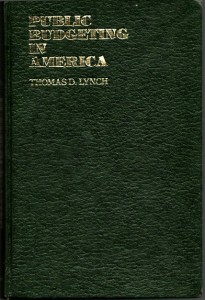Public Budgeting in America
PUBLIC BUDGETING IN AMERICA.
 Library of Congress Cataloging in Publication Data.
Library of Congress Cataloging in Publication Data.
Lynch, Thomas Dexter
Public Budgeting in America
Includes bibliographies and index.
1. Budget-United States I. Title.
HJ2051.L93 353.007’22 78-31170
ISBN 0-13-737346-5
© 1979 by Prentice-Hall, Inc., Englewood Cliffs, N.J. 07632
All rights reserved. No part of this book
may be reproduced in any form or
by any means without permission in writing
from the publisher.
Printed in United states of America.
PREFACE.
When I started teaching public budgeting, i found it quite difficult. I had worked in the federal goverment for six years as a program analyst. I felt that experience with strong feelings that skill development as well as thorough “feel” for budget behavior were essential fo a budget course. In preparing for the course, I felt there was no adequate book, so I created a budget game and held seminars on topics such as debt administration. Within two years, I realized that my teaching strategy was incorrect because the students were not getting enough of the vast basic knowledge essential for budgeting. My solution was to write and use this book.
My educational strategy is that must first give the student basic knowledge and concepts. Next, you can provide the skill development. Without the former, they are lot in a fog of public budgeting activities in which they do not know the vocabulary and concepts. The purpose of this book os to give undergraduates and graduates those basics. I teach the course over two semesters with skill development and exercises concentrated in the second semester. In teaching with the book, I merely ask many detailed questions on each chapter. When the questions are finished, the students know the material. I find this technique quite successful, for it permits excellent discussions and development of why certain details are important. The review questions at the end of the chapters serve as a pool form which I select the mid-term and final questions for graduate students.
The book is designed with students in mind. The first chapters provide the historical, political, and economic context for the course. The material tends to overlap some with other college courses. Thus students should feel more comfortable, but still challenge by the material. The other chapters cover the array of material in specific topic groups. This book is not a cookbook on budgeting, but it does help the students read and even write such a cookbook for their governmental context. The intended audience for the book is primarily the prospective professional manager, and secondly the non-public manager who wishes to understand what is or is not happening our governments.
My hope is that this text will provide a focus for the study of public budgeting and financial management. There has been a lack of direction and focus in this area for many years. Many have felt we need more skill development, model procedures and form, economic models, political and behavioral strategies. Frankly, i agree with most of the arguments. I find fault with those who feel that only their “thing” is worthy of serious attention. In writing this book, I felt a need to stress that our subject is applied social science and the focus must be on the user-the public manager. Given that perspective , the efforts of the social scientist can be understood as contributions to the langer society. My hope is that others will share the underlying belief in this book and that we build from this point. Rather than economists (or political scientist) talking to economist (or political scientist), I hope we all direct our ultimate attention to the users so that our contributions ca be better applied to improve today’s and tomorrow’s world. Theoretical arguments are important, but so applied social science.
When an author puts pen to paper, the product is said to be that of the author. That is wrong, especially in this case of this book. Evidence of my students, graduate assistants, former professors, colleagues, friends, secretaries, and, of course, family are present throughout this effort. Unfortunaly, only I can fully appreciate their contributions, but the credit (if any is be given) belogs to all. My students (Maxwell School, Cyracuse University and Mississippi State University) were my guinea pigs who were fed the early lectures and eventually the draft chapters. I was blessed with excellent unofficial and official graduate assistants: Lutu Nsaman assisted in preparing bibliographic references; Philomene Makolo and Glenda Owens assisted in the drafts, galleys, and page proofs. Professors Sydney Duncombe, Joseph Zimmerman, Lewis Welch, Ronald Stout, Donald Axelrod, Jesse Burkhead, James Carroll, Dwight Waldo, Howard Ball, Morris W. H. Collins, Walter Broadnax, and especially James Riedel are all thanked. Thanks also to Ray Pethel, Stan Wakefield, William Medina, Carl Stenberg, Philip V. Cortese, and R. Ken Hendrick, Jr.
Hopefully, this book will be used in many places. Professors and students. Please tell me what you think of this text. Your comments-orally or in writing-will be appreciated.
THOMAS D. LYNCH
